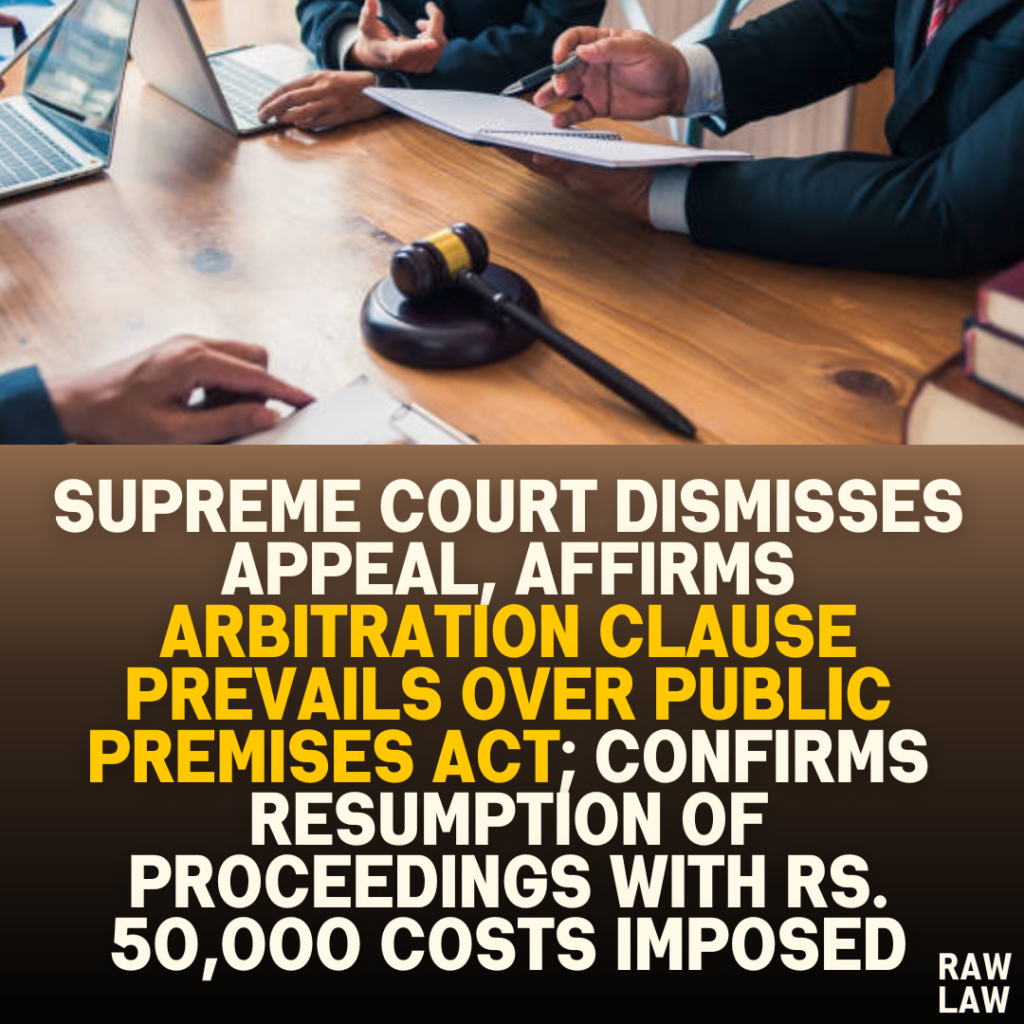Court’s Decision
The Supreme Court dismissed the appeal filed by the appellant, holding that the Public Premises Act, 1971 does not override the Arbitration and Conciliation Act, 1996. The Court upheld the High Court’s decision to appoint an arbitrator under Section 11 of the Arbitration and Conciliation Act, 1996 and directed that arbitration proceedings, which had been stayed, should resume expeditiously. The appellant was also ordered to pay costs amounting to Rs. 50,000 for pursuing unnecessary litigation.
Facts
The appellant, a statutory body under the Warehousing Corporations Act, 1962, had entered into a lease agreement with the respondent for the storage of goods. The respondent’s company, dealing in ceramic tiles and sanitary ware, was provided a storage space of 1295 sq. meters, with the agreement executed on September 26, 2012. The lease was to remain in effect for three years, ending on September 11, 2015, with the possibility of renewal by mutual consent. Clause 16 of the agreement contained an arbitration clause for the resolution of disputes.
As the lease period neared its end, the appellant revised the storage charges and raised demands for the increased amount. Despite several communications, the respondent did not vacate the premises when the lease expired, leading the appellant to invoke the provisions of the Public Premises Act. However, the respondent vacated the premises before the Estate Officer could pass an eviction order.
Issues
- Does the Public Premises Act, 1971 override the Arbitration and Conciliation Act, 1996?
- Did the High Court err in appointing an arbitrator under Section 11 of the Arbitration and Conciliation Act, 1996?
Petitioner’s Arguments
The appellant argued that the Public Premises Act governs the situation, thereby precluding the applicability of the Arbitration and Conciliation Act. According to the appellant, the Estate Officer’s order under the Public Premises Act had already addressed the issue of possession, rendering arbitration unnecessary.
Respondent’s Arguments
The respondent contended that disputes concerning the lease agreement, including the right of renewal and revised storage charges, fall squarely within the arbitration clause in the agreement. The respondent argued that the existence of the arbitration clause justified the referral of the dispute to arbitration under Section 11 of the Arbitration and Conciliation Act, 1996.
Analysis of the Law
The Supreme Court observed that the scope of the Public Premises Act is limited to the eviction of unauthorized occupants and does not extend to contractual disputes concerning the validity of a lease or the terms of its renewal. The court noted that the right of renewal and the revision of storage charges arose during the subsistence of the lease agreement, which contains an arbitration clause. Consequently, these issues are to be resolved under the Arbitration and Conciliation Act.
Precedent Analysis
The Court referred to its earlier decision in SBI General Insurance Co. Ltd. v. Krish Spinning, where it clarified the limited role of the referral court under Section 11 of the Arbitration and Conciliation Act. The examination at this stage is confined to the existence of an arbitration agreement, with any deeper examination of the dispute left to the arbitral tribunal.
Court’s Reasoning
The Supreme Court emphasized that the disputes concerning the lease agreement, including the right of renewal and the revised charges, clearly fall within the scope of the arbitration clause. The Public Premises Act does not override or interfere with arbitration proceedings arising out of contractual disputes. The Court cited its previous rulings to underscore the limited scope of inquiry at the stage of appointing an arbitrator.
Conclusion
The Supreme Court dismissed the appeal, directing that arbitration proceedings resume immediately. The Court also imposed costs of Rs. 50,000 on the appellant for pursuing unnecessary litigation.
Implications
The ruling clarifies the non-applicability of the Public Premises Act in situations where arbitration is explicitly provided for in a contractual agreement. It reinforces the principle that courts, while considering applications under Section 11 of the Arbitration and Conciliation Act, should only examine the existence of an arbitration agreement without delving into the merits of the dispute.



